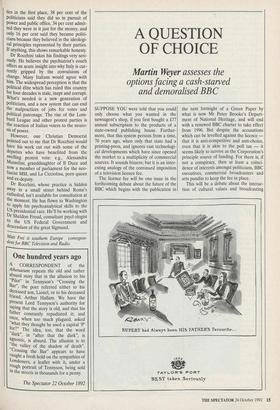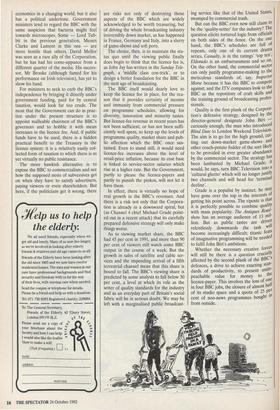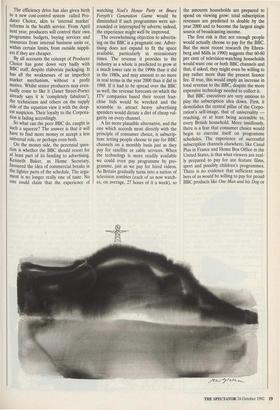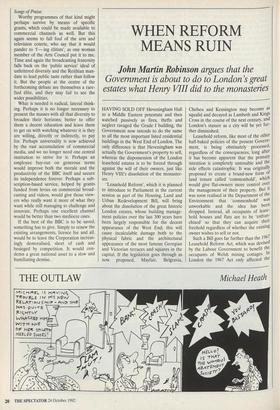A QUESTION OF CHOICE
Martin Weyer assesses the
options facing a cash-starved
and demoralised BBC
SUPPOSE YOU were told that you could only choose what you wanted in the newsagent's shop, if you first bought a £77 annual subscription to the products of a state-owned publishing house. Further- more, that this system persists from a time, 70 years ago, when only that state had a printing-press, and ignores vast technologi- cal developments which have since opened the market to a multiplicity of commercial sources. It sounds bizarre; but it is an inter- esting analogy of the continued imposition of a television licence fee.
The licence fee will be one issue in the forthcoming debate about the future of the BBC which begins with the publication in the next fortnight of a Green Paper by what is now Mr Peter Brooke's Depart- ment of National Heritage, and will end with a renewed BBC charter to take effect from 1996. But despite the accusations which can be levelled against the licence — that it is anti-competitive and anti-choice, even that it is akin to the poll tax — it seems likely to survive as the Corporation's principle source of funding. For there is, if not a conspiracy, then at least a coinci- dence of interests amongst politicians, BBC executives, commercial broadcasters and arts pundits to keep the fee in place. This will be a debate about the interac- tion of cultural values and broadcasting economics in a changing world, but it also has a political undertone. Government ministers tend to regard the BBC with the same suspicion that bacteria might feel towards microscopes. Some — Lord Teb- bit in the previous generation, Messrs Clarke and Lamont in this one — are more hostile than others. David Mellor was seen as a rare ally of the Corporation, but he has had his come-uppance from a different quarter of the media. His succes- sor, Mr Brooke (although famed for his performance on Irish television), has yet to show his hand.
For ministers to seek to curb the BBC's independence by bringing it directly under government funding, paid for by central taxation, would look far too crude. The most that the Government can do in prac- tice under the present structure is to appoint malleable chairmen of the BBC's governors and to hobble it with mean increases in the licence fee. And, if public funds have to be used, there is a hidden practical benefit to the Treasury in the licence system: it is a relatively easily col- lected form of taxation to which there is as yet virtually no public resistance.
The more hawkish alternative is to expose the BBC to commercialism and see how the supposed nests of subversives get on when they have to satisfy advertisers, paying viewers or even shareholders. But here, if the politicians get it wrong, there are risks not only of destroying those aspects of the BBC which are widely acknowledged to be worth treasuring, but of driving the whole broadcasting industry irreversibly down market, as has happened in France, Germany and Italy, into a slurry of game-shows and soft porn.
The choice, then, is to maintain the sta- tus quo until the viewing public finally does begin to think that the licence fee is, as John Jay has written in the Sunday Tele- graph, a 'middle class con-trick', or to design a better foundation for the BBC in the next age of broadcasting.
The BBC itself would dearly love to keep the licence fee in place, for the rea- son that it provides certainty of income and immunity from commercial pressure on programme schedules, allowing for diversity, innovation and minority tastes. But licence-fee revenue in recent years has not been sufficient, or has not been suffi- ciently well spent, to keep up the levels of programme quality, market share and pub- lic affection which the BBC once sus- tained. Even to stand still, it would need licence-fee increases above the level of retail-price inflation, because its cost base is linked to service-sector salaries which rise at a higher rate. But the Government, partly to please the licence-payers and partly to punish the pinkos, will not let it have them.
In effect, there is virtually no hope of real growth in the BBC's revenues. And there is a risk not only that the Corpora- tion is already in a downward spiral, but (as Channel 4 chief Michael Grade point- ed out in a recent attack) that its carefully prepared defensive strategy will only make things worse.
As to viewing market share, the BBC had 45 per cent in 1991, and more than 90 per cent of viewers still watch some BBC output in the course of a week. But the growth in sales of satellite and cable ser- vices and the impending arrival of a fifth terrestrial channel mean that this share is bound to fall. The BBC's viewing share is predicted by some analysts to fall below 30 per cent, a level at which its role as the setter of quality standards for the industry and as an everyday part of Britain's social fabric will be in serious doubt. We may be left with a marginalised public broadcast-
ing service like that of the United States, swamped by commercial trash.
But can the BBC even now still claim to be the 'quality-setter' for the industry? The question elicits tortured logic from officials on both sides of the fence. On the one hand, the BBC's schedules are full of repeats, only one of its current drama series, Casualty, is in the ratings' top ten', Eldorado is an embarrassment and so on. On the other hand, the commercial sector can only justify programme-making to the meticulous standards of, say, Inspector Morse because it has the BBC to compete against; and the ITV companies look to the BBC as the repository of craft skills and the training ground of broadcasting profes- sionals.
Quality is the first plank of the Corpora- tion's defensive strategy, designed by the director-general designate John Birt — curiously enough, the man who introduced Blind Date to London Weekend Television. The aim is to go for the high ground, cut- ting out down-market game-shows and other couch-potato fodder of the sort likely to be provided in ever greater abundance by the commercial sector. The strategy has been lambasted by Michael Grade; it would, he says, turn BBC Television into a 'cultural ghetto' which will no longer justify two channels and will head for 'terminal decline'.
Grade is a populist by instinct; he ing have gone over the top in the interests of getting his point across. The riposte is that it is perfectly possible to combine qualitY with mass popularity: The Antiques Road.- show has an average audience of 13 mil- lion. But as public tastes are driven relentlessly downwards the task Will become increasingly difficult; titanic featS of imaginative programming will be needed to fulfil John Birt's ambitions.
Whether the necessary creative forces will still be there is a question crucially affected by the second plank of the BBC s defences, a drive to achieve exacting stan- dards of productivity, to present unim- peachable value for money to the licence-payer. This involves the loss of one in four BBC jobs, the closure of almost half of its studio space and a quota of 25 Pe: cent of non-news programmes bought ni from outside. The efficiency drive has also given birth to a new cost-control system called Pro- ducer Choice, akin to 'internal market' reforms in the health service. From April next year, producers will control their own programme budgets, buying services and resources from internal business units or, Within certain limits, from outside suppli- ers if they are cheaper.
By all accounts the concept of Producer Choice has gone down very badly with BBC staff, despite elaborate packaging. It has all the weaknesses of an imperfect market mechanism, without a profit motive. Whilst senior producers may even- tually come to like it (Janet Street-Porter already says it is 'completely fabulous'), the technicians and others on the supply Side of the equation view it with the deep- est suspicion. Their loyalty to the Corpora- tion is fading accordingly. So what can the poor BBC do, caught in such a squeeze? The answer is that it will have to find more money or accept a less universal role, or perhaps even both. On the money side, the perennial ques- tion is whether the BBC should resort for at least part of its funding to advertising. Kenneth Baker, as Home Secretary, favoured the idea of commercial breaks in the lighter parts of the schedule. The argu- ment is no longer really one of taste. No one could claim that the experience of watching Noel's House Party or Bruce Forsyth's Generation Game would be diminished if such programmes were sur- rounded or interrupted by adverts; indeed, the experience might well be improved.
The overwhelming objection to advertis- ing on the BBC is a pragmatic one. Adver- tising does not expand to fit the space available, particularly in recessionary times. The revenue it provides to the industry as a whole is predicted to grow at a much lower rate in the 1990s than it did in the 1980s, and may amount to no more in real terms in the year 2000 than it did in 1988. If it had to be spread over the BBC as well, the revenue forecasts on which the ITV companies based their recent fran- chise bids would be wrecked and the scramble to attract heavy advertising spenders would dictate a diet of cheap vul- garity on every channel.
A far more plausible alternative, and the one which accords most directly with the principle of consumer choice, is subscrip- tion: letting people choose to pay for BBC channels on a monthly basis just as they pay for satellite or cable services. When the technology is more readily available we could even pay programme by pro- gramme, just as we pay for hired videos. As Britain gradually turns into a nation of television zombies (each of us now watch- es, on average, 27 hours of it a week), so the amounts households are prepared to spend on viewing grow: total subscription revenues are predicted to double by the year 2000 and to become the largest single source of broadcasting income.
The first risk is that not enough people would actually choose to pay for the BBC. But the most recent research (by Ehren- berg and Mills in 1990) suggests that 60-80 per cent of television-watching households would want one or both BBC channels and that, if asked, they might even be willing to pay rather more than the present licence fee. If true, this would imply an increase in total revenue to the BBC, despite the more expensive technology needed to collect it.
But BBC executives are very anxious to play the subscription idea down. First, it demolishes the central pillar of the Corpo- ration's self-image, that of universality — reaching, or at least being accessible to, every British household. More insidiously, there is a fear that consumer choice would begin to exercise itself on programme schedules. The experience of successful subscription channels elsewhere, like Canal Plus in France and Home Box Office in the United States, is that what viewers are real- ly prepared to pay for are feature films, sport and possibly children's programmes. There is no evidence that sufficient num- bers of us would be willing to pay for proud BBC products like One Man and his Dog or Songs of Praise.
Worthy programmes of that kind might perhaps survive by means of specific grants, which could be made available to commercial channels as well. But this again seems to fall foul of the arts and television coterie, who say that it would pander to 1— ing elitists', as one woman member of the Arts Council put it to me. Time and again the broadcasting fraternity falls back on the 'public service' ideal of unfettered diversity and the Reithian man- date to lead public taste rather than follow it. But the people at the centre of the forthcoming debate are themselves a rare- fied elite, and they may fail to see the wider possibilities.
What is needed is radical, lateral think- ing. Perhaps it is no longer necessary to present the masses with all that diversity to broaden their horizons; better to offer them a decent education and leave them to get on with watching whatever it is they are willing, directly or indirectly, to pay for. Perhaps universality is now achieved by the vast accumulation of commercial media, and we no longer need one central institution to strive for it. Perhaps an employee buy-out on generous terms would improve both the morale and the productivity of the BBC itself and secure its independence forever. Perhaps a sub- scription-based service, helped by grants funded from levies on commercial broad- casting and videos, would give those view- ers who really want it more of what they want while still managing to challenge and innovate. Perhaps one excellent channel would be better than two mediocre ones.
If the best of the BBC is to be saved, something has to give. Simply to renew the existing arrangements, licence fee and all, would be to leave the Corporation increas- ingly demoralised, short of cash and besieged by competition. It would con- demn a great national asset to a slow and humiliating demise.





































































 Previous page
Previous page